Report on the third meeting of the Internet Governance Forum (IGF)
January 21st, 2009
Misako Nomura,
Information Center of JSRPD
The third meeting of Internet Governance Forum was held in Hyderabad, India from December 3 to 6, 2008. The theme of this meeting is “Internet for All.” Some people from developed countries cancelled their participation because the terrorist attack happened in Mumbai and killed many people there. However 1.280 people from 94 countries participated in this meeting.
This meeting has no power to decide anything, but it is a good opportunity for multistakeholders including Governments, enterprises, citizens and academic world to freely discuss various issues about access to Internet on an equal basis. The main session focused on the following.
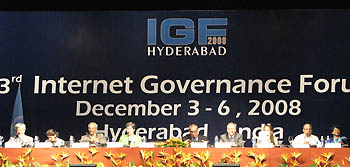
- Reaching the Next Billion
- Promoting Cyber-Security and Trust
- Managing Critical Internet Resources
- Emerging Issues- the Internet of Tomorrow
- Taking Stock and the Way Forward
In parallel with the main sessions, 87 workshops, best practice forums, and dynamic coalitions meetings organized by people who voluntarily work together about certain issue were held although some expected sessions were canceled because of sad events in Mumbai. As one of the features of this meeting, the proceeding was transcribed and displayed in real time on the screen of the main session hall. During the session of Dynamic Coalition on Accessibility and Disability (DCAD), the remote transcribing was used since a transcriber is located in Canada. In this session, people with hearing impairment participated in this session and they need the written information to join discussion. It is very interesting to see it because we, JSRPD had experiments about the possibility of remote transcribing before.
The representatives from DAISY Consortium were Hiroshi Kawamura, President of DAISY Consortium, Dipendra Manocha, Developing Countries Coordinator of DC, Mayu Hamada of ATDO, and Misako Nomura of JSRPD
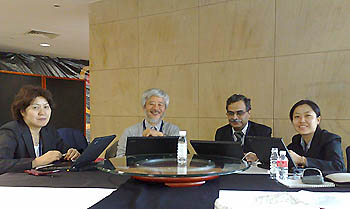
Hiroshi Kawamura participated in one of two Panel discussions focusing on “Internet for All-- Reaching the Next Billion” as a representative of disability field. The theme of this session is “Realizing Multilingual Internet” and moderated by Ms. Miriam Nisbet, Director of the UNESCO Information Society Division and chaired by Mr. Ajit Balakrishnan, Chief Executive Officer of Rediff. Com. His company announced that that its homepage will be in 8 languages in addition to English, such as Hindi, Marathi,Tamil, Telugu, Malayalam, Kannada, Bengali, Gujarati. The chair emphasized the implementation of multilingual internet in India. During the discussion of this panel discussion, the importance of Localization, its software developments to localize, internationalization of domain name was focused by 6 panelist including Hiroshi Kawamura and representatives from ITU and UNESCO.
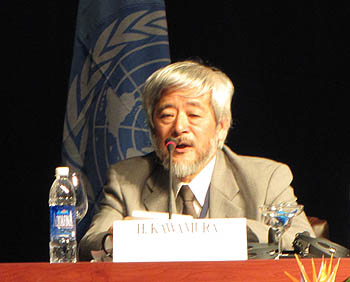
Hiroshi said the following;
“The DAISY Consortium was established to meet the requirements of people who are print-disabled, those who are blind and visually impaired, dyslexic and with other cognitive disabilities, etc. The core of the DAISY Consortium's activities is to develop the standard which is open, non-proprietary, inter-operable, and free of charge, to be shared worldwide. At the moment, we are in the revision stage of our standard to accommodate motion pictures to include sign language support and to meet the requirements of people who are intellectually disabled and so on.
The DAISY standard is being maintained by the DAISY Consortium, which is the international nonprofit organization legally established in Switzerland. We are targeting some of the global issues that are critical to be solved by DAISY technology, such as provision of accessible textbooks in the classrooms everywhere in the world, including indigenous people's schools. And secondly, the human security concerned information, such as disaster evacuation training manual. We had a very tragic experience of the Tsunami which hit many countries in the Indian Ocean. Not only residents in the region but also many foreign travelers were killed by the Tsunami. Evacuation manual for each area which is accessible and easy to understand should be closely connected with the early warning system. DAISY technology tackles this issue in Phuket and in Urakawa.
And HIV/AIDS is also very important global issue to be tackled by knowledge-based approach. If everybody knows how to treat HIV/AIDS, current disasters caused by HIV/AIDS may be minimized. E-environment will be another area to prove the effectiveness of the DAISY in multilingual context. Because DAISY is the technology which meets the special requirements of people with all types of disabilities; physical including visual or auditory, cognitive, intellectual and psychiatric.
The requirements of those people are quite unique. Such real-world requirements are real source of innovation. The synchronization of audio, graphics, and text gives very good flexibility of access to information through at least one of the channels.
Of course those who can see, hear, and read text may enjoy everything at once. Those who can only touch may read text in Braille and share the information at the same time. Those who are hard of hearing or deaf may have access to the oral presentation if it is synchronized with text and graphics or sign language interpretation, and join the sharing of knowledge and information.
The current paradigm of mainstream media has been neglecting some groups of people. Videos, they have very rich contents, but for those who cannot see the screen, it's almost impossible to understand what's going on without audio description. For audio contents, hard of hearing or deaf people should have captions or sign language interpretation to understand. For people with intellectual disabilities, combination of audio, graphics and symbols with plain text presented at slower speed are most helpful to comprehend the contents.
DAISY may include everything in one flexible standard format. Therefore, we believe that DAISY is the best way to read, and the best way to publish. DAISY creates a new paradigm, which will include everybody in the society and realize inclusive publications on the inclusive Internet.
In closing, I would like to stress that the basic principle of a democracy, which is Free and Prior Informed Consent. FPIC should be the basis of Internet Governance. This has been stipulated in the human rights conventions. The people who have been excluded from the internet community or internet services should be included with this principle. And I hope that DAISY technology and the DAISY Consortium will be contributing to this end.”
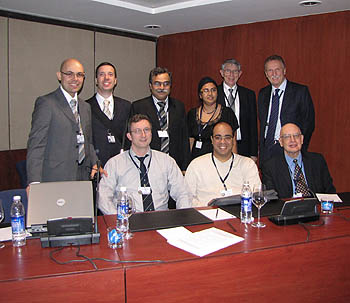
I hope that DAISY will be widely disseminated through the participants in this discussion.
There was DCAD workshop with the theme of ”Including Accessibility and Human Factors in the Universalization of the Internet - How to reach persons with disabilities, the 10% of the next billion.“ This session aims to highlight the necessity to make the Internet accessible to all, regardless of individual capabilities of different users. Dipendra made a presentation on “Information Accessibility for Disaster Preparedness and introduced the use of DAISY. The details of the session will be found at the following website.
http://www.itu.int/ITU-T/worksem/accessibility/200812/index.html
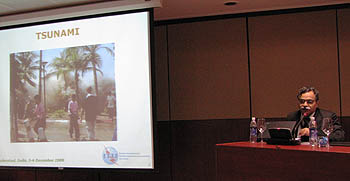
One of emerging issues in this meeting is ICT and climate change and Dynamic Coalition on Internet and Climate Change (DCICC). It held the first meeting to consider the objectives and activities of the Coalition and to consider key issues concerning the relation between the Internet and the climate change, indicating the Internet's impact on Climate Change and pointing out its potential for the reduction of greenhouse gas emissions. The Ministry of Internal Affairs and Communications (MIC Japan) is involved in the activities of this group as its founder member. The participants were encouraged to join this coalition. More information about it can be found by accessing to the following website.
http://www.intgovforum.org/cms/dc_workshops_08/igf_dcicc_MEETING.pdf
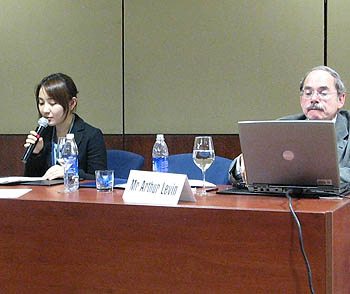
At the Closing Ceremony, Jainder Singh who spoke on behalf of the chairman of this Internet Governance Forum emphasized “a need to have a continuing dialogue regarding the management of critical Internet resources in order to ensure continuity of a secure and stable Internet infrastructure which has now become essential not only for the economies and security of the developed world but also to enable merging and developing economies to meet their development goals more effectively.”
The next IGF meeting will be held in Sham EL Shekikh, Egypt. In 2010 the meeting will be held in Vilnius, the Republic of Lithuania the achievement of this 5-year meeting will be expected since IGF would be reviewed within 5 years from its establishment.
